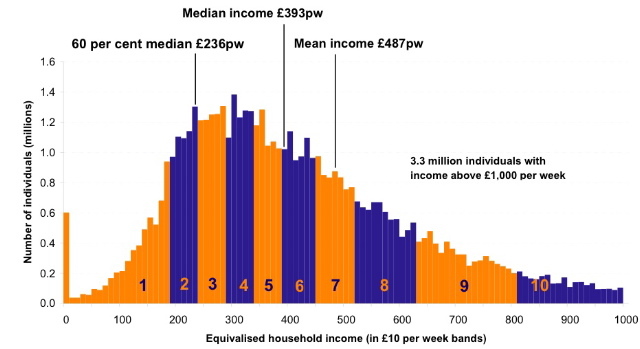When JK Rowling’s gives her endorsement of Gordon Brown in this week’s edition of Time magazine, she writes that the Dear Leader’s policies saw 600,000 children “raised out of poverty”. This particular piece of fiction that deserves some exploring, and not just because figures out today show it’s actually 400,000 and falling. This use of language, “raised out of poverty”, is one of the most pernicious Brownies out there – and is largely responsible for the appalling lack of progress made on tackling genuine poverty during the boom.
When Brown says “lifted out of poverty?” he means the number of people whose income rises above an arbitrary line – 60% of median income. This happens to be about the peak income distribution in Britain. So there are millions who can be “lifted out of poverty” if their income goes up by £10 a week – if they get precision bombed by the right tax credits.

In the last 12 years, rather than tackle poverty, Brown has sought to manipulate this graph – and spent billions upon billions doing it. Using tax credits, he tries to move those just below the 60% median income line (on the left) to just above it. I would dearly love to interview some people who Brown claims have been “raised out of poverty” and ask them to describe the experience. Any money they’d be amazed to find themselves so described. If you are not near a threshold, then forget it. Here is the average income of the poorest 10% – unsurprisingly, the DWP don’t do a graph, but I fished it out of the annex.

The problem for Brown is that this financial chicanery cuts boths ways. The slightest shift in the economy and they can come falling back below the theshold. The Institute for Fiscal Studies, which audits these figures for the DWP, shows that from April 2007 to April 2008 poverty increased by 200,000 after housing costs and 300,000 before housing costs. So on today’s figures 200,000 more children have been “plunged into poverty” since 2004-05 (before housing costs) and 100,000 more children “plunged into poverty” over 2007/08 after housing costs. Except they haven’t really been plunged into poverty, just as they weren’t really lifted out of it in the first place.







Comments